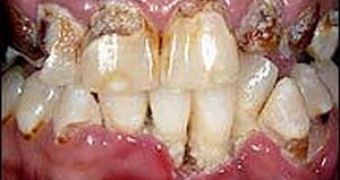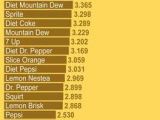It may take you by surprise, but drinking your Cola is almost like putting battery acid in your mouth.
A new research at the Southern Illinois University School of Dental Medicine found that long time exposure to soft drinks can corrode significant enamel amounts, even if many people are more worried about their sugar level and its effect on the bodyweight.
A 2006 research showed that cola beverages destroy 10 times more teeth material than fruit juices in just the first three minutes of drinking. The harmful effect of these beverages was found to be due to the citric acid and/or phosphoric acid content.
Non-cola beverages, even if less acidic than colas, were found to be more corrosive. "The findings cannot be applied to real life situations where people's eating and drinking behaviors are very different and there are many factors at work", reacted American Beverage Association spokesperson Tracey Halliday.
The research investigated the acidity (pH) of 20 commercial soft drinks and their diet versions soon after cans were opened. Value seven means neutral pH, over 7 alkaline (basic), which is neutral for the teeth and under 7 is acidic and corrodes tooth enamel.
The pH value of the battery acid is 1.
Slices of enamel from freshly extracted teeth were placed in soft drinks for 48 hours. Teeth that were put in Coke, Pepsi, RC Cola, Squirt, Surge, 7 Up and Diet 7 Up presented a 5 % weight loss next morning and the general losses were of 1.6- 5 %. "RC Cola was found to be the most acidic soft drink studied, with a pH of 2.387" said Academy of General Dentistry spokesman Kenton Ross.
Cherry Coke is next most acidic (pH of 2.522), and Coke the third most acidic checked soda (pH of 2.525).
But the type of acid in the soda and calcium content also interact. Citric acid is the most erosive acid, and is more abundant in non-cola drinks. "The bottom line is that the acidity in all soft drinks is enough to damage your teeth and should be avoided," said Ross.
Root beer was the least acidic of all beverages, with a pH 4.038, as it is often non-carbonated and lacks phosphoric or citric acids.
A 2006 research found that orange juice and sports drinks attack the tooth enamel.
Americans have passed in a half century from calcium and proteins rich milk to beverages that are devoid of any nutritional value. In 1966, Americans consumed annually, on average, 20 gallons of soft drinks and 33 gallons of milk while in 2003, the numbers were 46 and 22.
Of course, no one drinks cola non-stop for two full days, but the corrosive effect starts immediately and aggravates in time. "The most protective factor you have in your mouth is saliva, which has both a diluting and a buffering effect. Of course, you're not going to mirror reality (with the new study). There are many foods which are as important as soft drinks in oral health and dental hygiene," said Richard Adamson, a scientific consultant to the American Beverage Association, claiming that the research did not consider also factors like toothbrushing.
"Fruit and fruit juices and cider and food such as pickles and salad dressing and wine-those are just as important in regards to general erosion as soft drinks. There is no single food or beverage that is responsible for dental erosion. There are numerous factors. The thing is to enjoy everything in moderation."
Drinking soda through a straw, if at all, decreases the teeth's contact to the beverage, warned Ross. "One way to reduce soda intake, he suggested, is to drink it only with meals."

 14 DAY TRIAL //
14 DAY TRIAL // 
